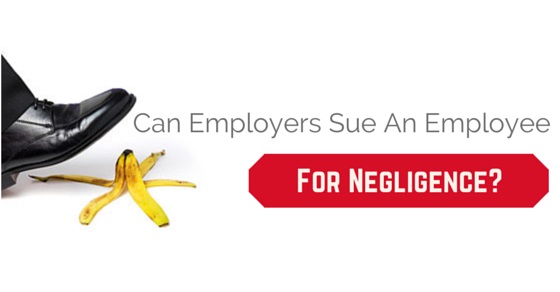However the employer must have an extremely compelling reason to sue in order to succeed and that does not usually include poor performance or unintentional carelessness. The answer is no.
 Can Employers Sue An Employee For Negligence Wisestep
Can Employers Sue An Employee For Negligence Wisestep
The answer unsurprisingly is yes although it is more difficult for an employer to sue an employee than vice versa.

Can an employer sue an employee. Employment is a very important factor in leading a successful life. When acting for an employer we are often asked whether an employee can be sued for damages that the employer sustains as a result of an employees negligence. If an employer does so and commits a discriminatory firing on the basis of an employees protected status the employee would have grounds to pursue a wrongful termination claim through the EEOC.
Yesterday in addition to announcing its new guidance on retaliation the EEOC announced in a separate press release that it had obtained a judgment against an employer whom it claimed had retaliated against a former employee by suing her after she filed a complaint of pay discrimination with EEOC. The short answer. Intentional destruction of property is.
The companys demand can be for the return of the property or the monetary value of the property. An employer accepts the risk of employee fallibility and takes that into account in the costs of doing business supervising the employee and insuring the enterprise. Sue Your Employee For Theft In the event that an employee wrongfully keeps company property the company can sue the employee.
While it is more difficult for an employer to sue an employee than vice versa there are many valid legal reasons that an employer may bring a cause of. The question then becomes whether the employer can recover the damages it paid to the third party from the negligent employee. A Suit to Recover Damages Payable to a Third Party It is settled law that employers are vicariously responsible for the harm caused by an employee in the performance of the employees duties.
A case recently decided by the Alberta Court of Queens Bench Shamac Country Inns Ltd. If you believe you have a cause of action against an employee we can answer your questions and advise you of your options. You can find a copy of the Consent Order here.
Being employed is an essential part of ones life which gives them confidence and facilitates to head their lives happily. In the recent case of M-I Drilling Fluids Canada Inc. Yes in some cases an employer can sue an employee for losses suffered at their hands.
Moreover having a full-time permanent job is a boon in disguise especially in this competitive market. Sandys Oilfield Hauling Ltd does not purport. Can an Employer Sue an Employee.
When Can an Employer Sue an Employee. Everyone knows that employees can sue their employers for a wide variety of reasons but some people still wonder if employees can be sued by an ex-employer. Two Kinds of Obligations.
The short answer is yes and these are the most common reasons an employer can sue an employee successfully. The only way an employer can commit a wrongful termination is by firing an employee on an illegal and discriminatory basis. So whenever employer-employee forms a contract employees are entitled to get a salary for their work and if it is not paid the employers can be sued for such non-payment.
Two requirements Duty of the tortfeasor the employee to the employer. This always is not the case that only the head can sue his employee but it happens the other way too. Employees are able to sue their bosses if they catch Covid-19 while commuting to work or while in the office and there is no legal requirement for anyone to be called back in if they can.
The Miller Law Firm has successfully represented many employers who need to sue an employee for things like breach of a noncompete agreement employee theft and breach of fiduciary duty. In situations of ignorance the employee can file for a complaint or legal claim against the person for violating or failing to protect the rights in either case. V Cottle the employee was a senior-level fiduciary employee.
What Can An Employer Sue An Employee For. This is because under the law of contracts when parties sign any contract under free consent it. There is no law in California that prevents an employer from suing an employee.
Can an employer sue an employee for professional errors or omissions which result in loss to the employer.
